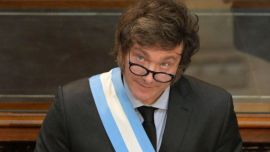Tensions in Argentina’s ruling coalition are becoming impossible to ignore – even government officials are now admitting publicly that all is not well within Frente de Todos.
Hours after Congress granted approval to Argentina’s controversial new financing programme with the International Monetary Fund (IMF) – the 22nd in the country’s history – unrest in the ruling coalition was being debated in the corridors of power, with those who did not back the deal drawing considerable attention.
Notably, Cristina Fernández de Kirchner was absent for much of the debate in the Senate on Thursday night, despite her position as head of the upper house. According to government sources, the relationship between President Alberto Fernández and his vice-president is more fragile than ever.
Responding to questioning from journalist Ernesto Tenenbaum, Government Spokesman Gabriela Cerruti admitted Friday that the vice-president had failed to respond to a message from her boss expressing his solidarity after the windows of her Senate office were hit by rocks and stones by protesters outside Congress demonstrating against the IMF deal.
Nevertheless, the spokesperson played down reports of personal enmity and claims that the relationship is broken.
"I separate what are personal conflicts from what are work-related,” she told Radio Con Vos. “We don't have to be friends to govern together. In fact, it is not good to be friends to govern together, but what is good is to have unity in action once decisions are made and that is what is happening.”
"Regarding the political relationship, we saw how the vote was taken last night and in the Chamber of Deputies; these things do not depend on a tweet or a message, the votes express an internal discussion about an important project for the government. It is healthier to discuss political issues than personal issues," Cerruti argued, subtly referring to tensions in the ruling coalition.
"The votes in the different chambers [lower and upper house] expressed an internal discussion on a very important fact that for the government is a very important bill," he admitted. "The approval of the agreement last night gives us the margin to be able to start today with the macroeconomic variables that have to do with inflation.”
Senator Oscar Parrilli, aligned with Fernández de Kirchner, quoted the veep on his Twitter account in a post, assuring that "the unity of the leaders" is not necessary for the electoral triumph.
“As Cristina Fernández de Kirchner says, elections are not won with the unity of the leaders, but by governing to improve the quality of life of the people,” he declared, posting a photo of him with councillors from the ruling coalition.
The former president's unhappiness is not an isolated case. During the debate in the lower house Chamber of Deputies, the ruling coalition’s former caucus leader Máximo Kirchner was absent for much of the debate, only arriving to vote against the IMF deal. The lawmaker, who is the son of Fernández de Kirchner, resigned his position in protest against the accord last month.
On Friday morning, reacting to the Senate vote that approved the IMF deal, the 13 Kirchnerite lawmakers who voted against the accord said in a statement that the “goals proposed by Argentina” would be “impossible” to meet.
"Despite our willingness to honour debts, we know that adjusting the middle and low income sectors is by definition counterproductive to the very objectives of economic growth," they argued in an eight-page document that slammed the “false” beliefs that underline the IMF deal.
"This artificial crossroads to which they are trying to subject us, if accepted, would be a defeat not only for the people who will suffer the consequences of this pact, but also a defeat for politics, a true and vital tool that we are not prepared to accept from our benches, but fundamentally as activists," said the Kirchnerite lawmakers.
Tensions also emerged between Economy Minister Martín Guzmán and Energy Secretary Darío Martínez, who questioned government policy in a letter that was later leaked to the press.
Cerruti was quizzed about this as well: "Yesterday's specific proposal by Darío Martínez is a proposal he is making as a system, because he is asking the finance secretary that as a result of the international crisis he is going to need more funds and a new budget ceiling. They met, they resolved it, they made progress on the issue... and then someone leaks this letter to the media as if this were an internal affair; we can't be running after those who want to see an internal affair in every discussion all the time.”
For her part, the spokesperson insisted that "there is a certain tendency to read any situation that arises in the administration through this frame," adding that the press “wants to paint every situation in the government as an internal fight.”
Speaking on Friday, President Fernández sought to send a message to the unsettled in his coalition.
“We have to make an effort together. There is a time in Argentina that we must inaugurate once and for all and it is the time to work united and together," declared the president, flanked by key officials.
“We had too many years to mark our differences, and it no longer makes sense to mark those differences, because the citizens' problems are of a different magnitude.”
– TIMES/NA/PERFIL























Comments